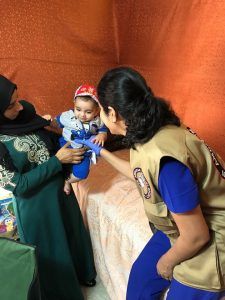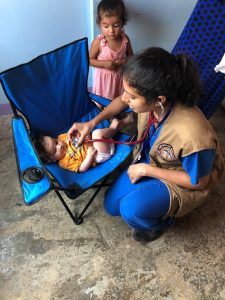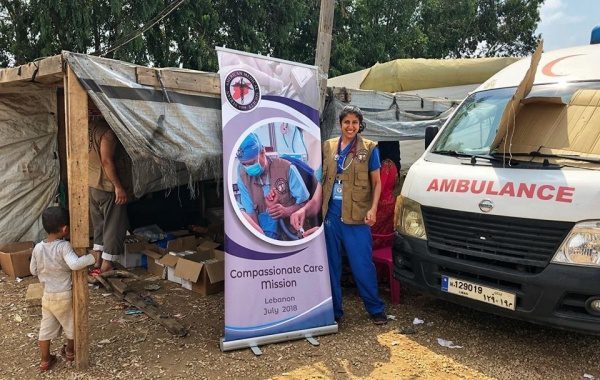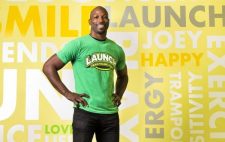 This past summer, Cherry Hill native Shweta Iyer, MD, traveled to the Syrian border to help families fleeing the war-torn country. A resident in pediatric emergency medicine, Iyer spent 10 days at the Syrian/Lebanon border, leaving her then 8-month-old daughter to take the trip. Moved by what she saw and who she helped, and those she couldn’t help, Iyer, 30, wrote this letter to her daughter, Anvi.
This past summer, Cherry Hill native Shweta Iyer, MD, traveled to the Syrian border to help families fleeing the war-torn country. A resident in pediatric emergency medicine, Iyer spent 10 days at the Syrian/Lebanon border, leaving her then 8-month-old daughter to take the trip. Moved by what she saw and who she helped, and those she couldn’t help, Iyer, 30, wrote this letter to her daughter, Anvi.
Dearest Anvi,
You have given me the most challenging job – that of being a mother. You have given me a purpose in life I could have never dreamed of, and this has inspired me to help other mothers reach their potential and, as a pediatrician, care for others’ children in the best way possible. One day when you are old enough to read and understand, I want you to have this letter.
***
“How could you leave your child behind? How could you take that risk?”
When I talk about my recent mission in Lebanon, these are the most common questions I hear from fellow parents. Not questions about any prior experience working in refugee camps or how difficult it is to see families in such dire conditions. The questions are always centered around my decision to leave my baby at home to go…there.
I traveled to Lebanon to work with Syrian refugee children at camps near the border. After reading the news and feeling helpless about the trauma children were suffering in the war-torn country, I felt a calling to provide aid in whatever form I could. I remember feeling apprehensive as I packed up various medical supplies, not knowing at all what to pack for my ‘doctor’s bag’. Perhaps the real apprehension stemmed from the fact that I didn’t know what emotions I would feel once there.
I arrived in Lebanon with a team of strangers including physicians, interpreters and volunteers from all over the world, and together we made our way to the Syrian border. I can still remember the trepidation with which we entered the refugee camps. We did not know what to expect. But one thing was clear – the war had taken its toll.
As soon as I entered the camp, an 8-year-old patient who was accompanied by his family softly told me that he had a problem with his blood. Piecing together bits of Arabic and instinctively reading the worried lines on his mother’s face, I learned that her son had recently been diagnosed with a serious blood disorder requiring a bone marrow transplant. His mother’s eyes pleaded with me to do something, anything, to help her son. She explained to the interpreter how her life had changed from the moment he was diagnosed in Syria. After fleeing to Lebanon, they could not afford the treatments for his disease. “Khadhih maeak ‘iilaa America” (translation: Take him with you to America), she begged me repeatedly. Despite wanting to believe otherwise, I knew I had no easy solutions for her son. It was the start of my emotional unravelling.
The most difficult encounter I experienced happened soon after that. A mother and father walked in with their two sons. As soon as I laid eyes on the second son, I knew something was not right. He looked sickly and weak, his general appearance contrasting with the smile on his face. After some back and forth translations, I understood that he had recently been diagnosed with an extremely aggressive form of brain cancer. His parents came not to learn more about the diagnosis or treatment, but to beg for hospice care. They had been receiving care in Syria, but since escaping to Northern Lebanon, they were unable to afford the expenses. His parents came to us full of hope, despite the bleakness of the situation. However, although we had packed to treat infectious diseases and vitamin deficiencies we anticipated the refugees might face, we had nothing in our arsenal to treat end-stage brain tumors. With my few resources and limited local knowledge, I began to feel utterly helpless. When you have been trained to do all you can for your patient, it is nearly impossible to settle for much less. I offered whatever help I could at the moment, but I couldn’t deny my feelings of hopelessness.
 Despite all the hardships these refugee families faced, one commonality rose above all – these parents were breaking walls to help their children. As I sat with my team that evening, collectively shedding tears for families we could not help enough, I felt conviction in my mission here. I had left behind the comforts of my own home for this purpose. Leaving my baby behind was not easy, and there was some inherent risk involved in travel to the border – but this was my duty to fulfill. Once here, I realized I was right to come, at least for how it affected me and helped me grow as both a physician and a mother. These parents’ hope and resilience despite their situation had profoundly inspired me, and I felt empowered to do my part to help.
Despite all the hardships these refugee families faced, one commonality rose above all – these parents were breaking walls to help their children. As I sat with my team that evening, collectively shedding tears for families we could not help enough, I felt conviction in my mission here. I had left behind the comforts of my own home for this purpose. Leaving my baby behind was not easy, and there was some inherent risk involved in travel to the border – but this was my duty to fulfill. Once here, I realized I was right to come, at least for how it affected me and helped me grow as both a physician and a mother. These parents’ hope and resilience despite their situation had profoundly inspired me, and I felt empowered to do my part to help.
Warsan Shire wrote a beautiful poem, with a line that goes, “home is the mouth of a shark….you have to understand, no one puts their children in a boat unless the water is safer than the land.” The word “home” gains a completely new meaning when there is no choice but to leave familiar territory and venture into the unknown. Being a doctor isn’t easy. Being a mother isn’t easy. But harder still is being a mom from a war-torn country. You face dire consequences whether you stay or escape with the hope of providing your children a better life.
Every mother faces her own battles. When I was pregnant, I had gone to my routine obstetric appointment and found that my pregnancy was not progressing normally. I was told the baby was not growing at a normal rate. To all my questions, my doctor offered one refrain: “I don’t know what will happen.”
These words haunted me until the day you were born. You cannot fully comprehend how much love you hold for another being until you realize you are growing your own. At that time, despite being a pediatrician, I felt helpless.
When we had our traditional prayer ceremony for my pregnancy, I implored, “I will suffer – let anything happen to me – but please let Anvi be fine.” I knew in that moment, even without meeting you, that I had already become a mother. I would sacrifice anything for you, and I would not lose hope.
Meeting you two months later, healthy and happy, was the perfect miracle. I am one of the lucky ones. I am blessed. Not everyone is. That journey into motherhood has helped me understand the “other” side, as I went from doctor to patient. Being a mother has undoubtedly made me a better pediatrician. It was partly this which inspired me to leave you and fulfill my mission. I wanted to help other parents who feel helpless themselves. The circumstances of their tests may be different, but their love for their children is the same.
Ultimately, however small my part, I take comfort in the fact that I did something. My team and I were able to provide primary medical care for many children, and in most instances, point families in the right direction for advanced treatment. We were lucky to have the full support of other specialists in Beirut and even other medical organizations. But most importantly, we worked with parents who were unapologetic in their crusade for their children. I fully understand the depth of sacrifice these parents made – no matter what the situation, a mother’s love for her child is endlessly powerful and unconditionally persevering.
Going on this trip has made me both a better doctor and a better mother. Being a mother means caring for someone with every fiber of your being. I have learned about the difficulties in giving up everything familiar and known for your child, with the hopes of providing a better life. I have gained perspective on mothering in a place where the odds are stacked against you, and truly understand the meaning of the word “sacrifice.”
And you will grow up hearing about these experiences, and understanding what it means to help those in need despite the barriers and possible objections. You will appreciate how your parents supported each other to make a difference. I know you will make an impact, just as I hope I have.
For now, I am planning my next mission for 2019. There is still so much work to do.
Love, Mom














